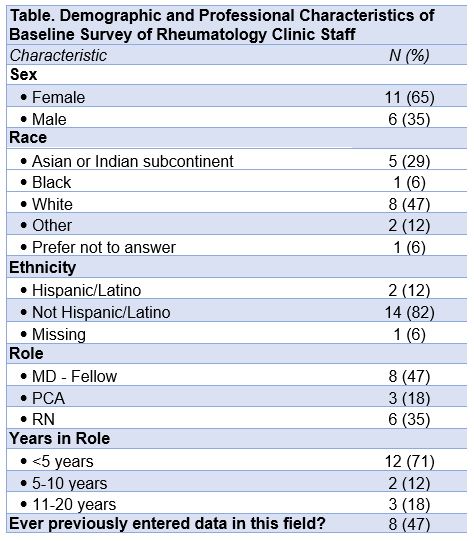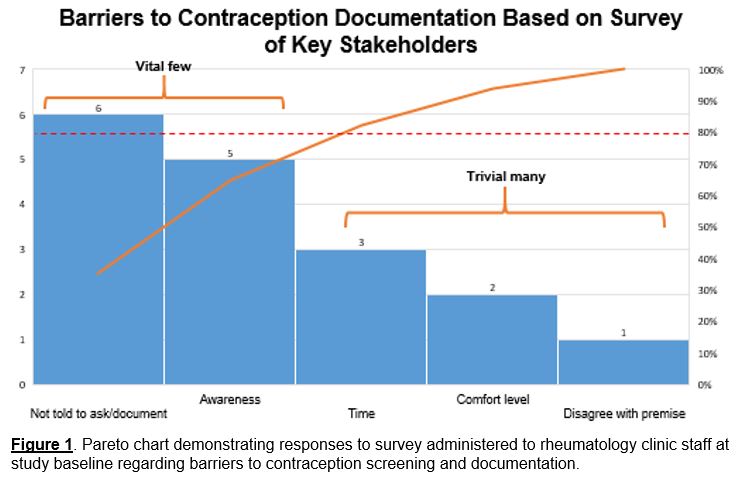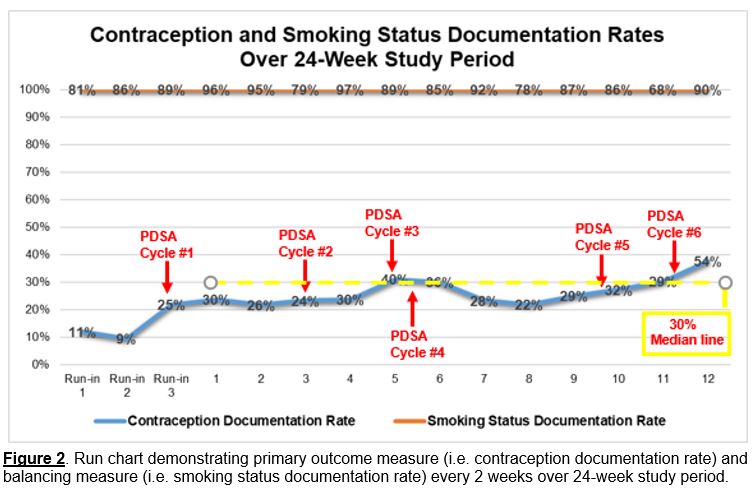Session Information
Date: Sunday, November 12, 2023
Title: (0460–0479) Reproductive Issues in Rheumatic Disorders Poster I
Session Type: Poster Session A
Session Time: 9:00AM-11:00AM
Background/Purpose: Only one-third of reproductive-aged women with rheumatic disease (RD) are prescribed effective contraception, even if prescribed teratogenic medications (Talabi et al. Arthritis Care Res. 2019). Contraception counseling and documentation are important steps to improve effective contraception use in at-risk patients; however, in a nationwide study, less than 10% of women with SLE or RA had contraception documented in a structured electronic health record (EHR) field (Clowse et al. Arthritis Care Res. 2023). The aim of this quality improvement (QI) initiative was to increase the rate of provider screening and documentation of contraception use for female patients aged 18-45 seen in an academic rheumatology clinic from our baseline of 11% to 50% by 24 weeks.
Methods: We administered a survey to clinic staff including demographic information, professional credentials and years of experience, and barriers to contraception documentation and desired interventions. We conducted 6 Plan-Do-Study-Act (PDSA) cycles including educational presentations and motivating reminders for clinic staff, devised to address the “vital few” barriers (representing 80% of responses) identified.
The primary outcome measure was the percentage of the study population with contraception use documented in the structured EHR field. The primary balancing measure was the percentage of the study population with smoking status documented in the structured EHR field. The primary process measure was percentage of contraception documenters who were non-MD clinical staff, as the intervention focused on this group. We tracked primary outcome, process, and balancing measures at 2-week intervals over 24 weeks; we tracked primary outcome and balancing measures on a run chart.
Results: Baseline survey respondents (n=17) were 65% female; 47% White and 29% Asian/Indian; 82% Not Hispanic/Latino; 53% Registered Nurses/Personal Care Assistants and 47% Rheumatology Fellows [Table]. The “vital few” barriers to contraception documentation were not having been told to document this information and lack of awareness of this EHR field [Fig. 1]. The intervention most frequently suggested by respondents (47%) was education.
Interventions included an introductory educational session with documentation instruction and scripts to guide screening (PDSA #1), email reminders from nursing leadership (PDSA #2 and #5), and interim educational sessions (PDSA #3, #4, #6). Over 24 weeks, the rate of contraception documentation increased from 11% to 54% (median 30%) and the median smoking status documentation rate was 88% (68%-97% range) [Fig. 2]; the median rate of non-MD clinical staff documenters was 92% (70%-100% range).
Conclusion: A multi-cycle educational intervention designed based on key stakeholder feedback led to an increase in the contraception documentation rate from 11% to 54% for reproductive-aged women seen in our rheumatology clinic over 24 weeks. Future phases of this QI initiative will focus on encouraging rheumatologists to provide contraceptive counseling and referrals to women’s health providers for patients who are prescribed teratogenic medications.
To cite this abstract in AMA style:
Siegel C, Jannat-Khah D, Mikhaylov A, Abramson E, Pan N, Sammaritano L. Educational Intervention to Increase Contraception Screening and Documentation for Reproductive-Aged Women Seen in an Academic Rheumatology Clinic [abstract]. Arthritis Rheumatol. 2023; 75 (suppl 9). https://acrabstracts.org/abstract/educational-intervention-to-increase-contraception-screening-and-documentation-for-reproductive-aged-women-seen-in-an-academic-rheumatology-clinic/. Accessed .« Back to ACR Convergence 2023
ACR Meeting Abstracts - https://acrabstracts.org/abstract/educational-intervention-to-increase-contraception-screening-and-documentation-for-reproductive-aged-women-seen-in-an-academic-rheumatology-clinic/



